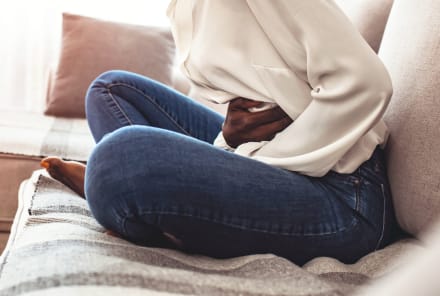Advertisement
How Long You Need To Walk To Undo The Nasty Effects Of Sitting All Day


If—in the words of Dolly Parton—you're workin' 9 to 5, there's a good chance you're sitting down for a good chunk of the day. We all know that sitting just isn't that good for us; study after study has shown that doing so can contribute to a wide range of ailments from obesity to back pain.
But now, one study tells us what we need to do to counteract the effects of sitting all day. How? By telling us exactly how often and for how long we need to get on our feet.
The power of exercise "snacks"
Led by Keith Diaz, Ph.D., an associate professor of behavioral medicine at Columbia University, this study tested a variety of mini-walking sessions, which they called exercise "snacks," on a group of 11 adults. All 11 participants sat in an ergonomic office chair for eight hours, getting up only to use the bathroom or for their prescribed exercise "snacks."
While the participants sat there (don't worry, they were allowed to work, read, or use their smartphones!) the researchers measured their blood sugar and blood pressure levels, which are good markers of cardiovascular health.
The different types of exercise "snacks" included:
- 1 minute of walking for every 30 minutes of sitting
- 1 minute of walking for every 60 minutes of sitting
- 5 minutes of walking for every 30 minutes of sitting
- 5 minutes of walking for every 60 minutes of sitting
- No walking (except for bathroom breaks)
Not surprisingly, the results showed that five minutes of walking for every 30 minutes of sitting was the most beneficial. What was surprising, however, was just how beneficial this exercise "snack” was. While five minutes doesn't seem like much, a five-minute walk break can offset some of the most detrimental effects of sitting all day.
The power of the 5-minute walk
Specifically, the study found that five minutes of walking led to a statistically significant reduction in blood sugar and blood pressure levels. After large meals, the participants who walked for five minutes every 30 minutes had 58% lower blood sugar spikes than those who sat all day.
The results also showed that walking for one minute every 30 minutes was also beneficial but not nearly as much. Walking once an hour for either one minute or five minutes did not benefit blood sugar levels.
Perhaps even more interestingly, all exercise "snacks" significantly decreased blood pressure levels by 4 to 5 mmHg. According to Diaz, "This is a sizable decrease that's comparable to the reduction you would expect from exercising daily for six months."
Get moving during your workday
The researchers didn't stop at cardiovascular risk, either. In fact, the results also showed that all the snacks—except walking for one minute every hour—led to improvements in fatigue levels and mood. As Diaz explains, "The effects on mood and fatigue are important…people tend to repeat behaviors that make them feel good and that are enjoyable."
With only 11 participants, this is an extremely small study, so we have to take the results with a grain of salt. Still, it's very helpful to have a concrete idea of how frequently and for how long we need to walk to counteract the effects of sitting.
Fortunately, the same group of researchers is conducting another study testing 25 different exercise "snacks" on a larger sample size of people, which will give us even more clarity. For now, what we know for sure is that getting up to walk to get coffee, investing in a standing desk, or scheduling a walking meeting can benefit our health in more ways than one.
If you want to walk more during your workday, here are some ideas to help you accomplish that:
- Set a reminder. Set a reminder on your calendar or phone. You can't walk if you don't remember to do it!
- Walk and talk. Need to call the airline to change your flight, talk to your landlord, or check in with a parent, child, or sibling? Try walking while you make that call.
- Take a coffee break. If you're walking to get coffee, try popping into a coffee shop that's a little farther away.
- Go to the second closest bathroom. If you're taking a bathroom break and you work in a big office, try going to one that's across the office or on a different floor.
- Get a treadmill desk. If a treadmill desk can fit into your budget, it can be a great way to get your daily steps in.
- Wear a step-counting device. Many smartwatches and fitness trackers count your steps. Setting and aiming for a daily step goal can further serve as motivation to get up and walk regularly.
Other ways to increase your mood and loosen up during the workday include doing some light deskside stretching, eating nourishing foods, and taking a supplement that contains calming ingredients. Here are our top 14 picks that actually relieve stress.
The takeaway
Researchers tested several types of walking breaks and found that if you want to reap the greatest benefits, walking once every 30 minutes for 5 minutes is the goal. Fortunately, there are a lot of ways to incorporate walking into your day.
Watch Next
Enjoy some of our favorite clips from classes
Enjoy some of our favorite clips from classes
What Is Meditation?
Mindfulness/Spirituality | Light Watkins
Box Breathing
Mindfulness/Spirituality | Gwen Dittmar
What Breathwork Can Address
Mindfulness/Spirituality | Gwen Dittmar
The 8 Limbs of Yoga - What is Asana?
Yoga | Caley Alyssa
Two Standing Postures to Open Up Tight Hips
Yoga | Caley Alyssa
How Plants Can Optimize Athletic Performance
Nutrition | Rich Roll
What to Eat Before a Workout
Nutrition | Rich Roll
How Ayurveda Helps Us Navigate Modern Life
Nutrition | Sahara Rose
Messages About Love & Relationships
Love & Relationships | Esther Perel
Love Languages
Love & Relationships | Esther Perel
What Is Meditation?
Box Breathing
What Breathwork Can Address
The 8 Limbs of Yoga - What is Asana?
Two Standing Postures to Open Up Tight Hips
How Plants Can Optimize Athletic Performance
What to Eat Before a Workout
How Ayurveda Helps Us Navigate Modern Life
Messages About Love & Relationships
Love Languages
Advertisement

Yes, There's A Longevity Vitamin (& People Over 40 Need To Prioritize It)
Molly Knudsen, M.S., RDN

Study Investigates How Fasting Impacts Sleep, Hormone Health & More
Gretchen Lidicker, M.S.

Yes, There's A Longevity Vitamin (& People Over 40 Need To Prioritize It)
Molly Knudsen, M.S., RDN

Study Investigates How Fasting Impacts Sleep, Hormone Health & More
Gretchen Lidicker, M.S.

Yes, There's A Longevity Vitamin (& People Over 40 Need To Prioritize It)
Molly Knudsen, M.S., RDN

Study Investigates How Fasting Impacts Sleep, Hormone Health & More
Gretchen Lidicker, M.S.

Yes, There's A Longevity Vitamin (& People Over 40 Need To Prioritize It)
Molly Knudsen, M.S., RDN

Study Investigates How Fasting Impacts Sleep, Hormone Health & More
Gretchen Lidicker, M.S.














